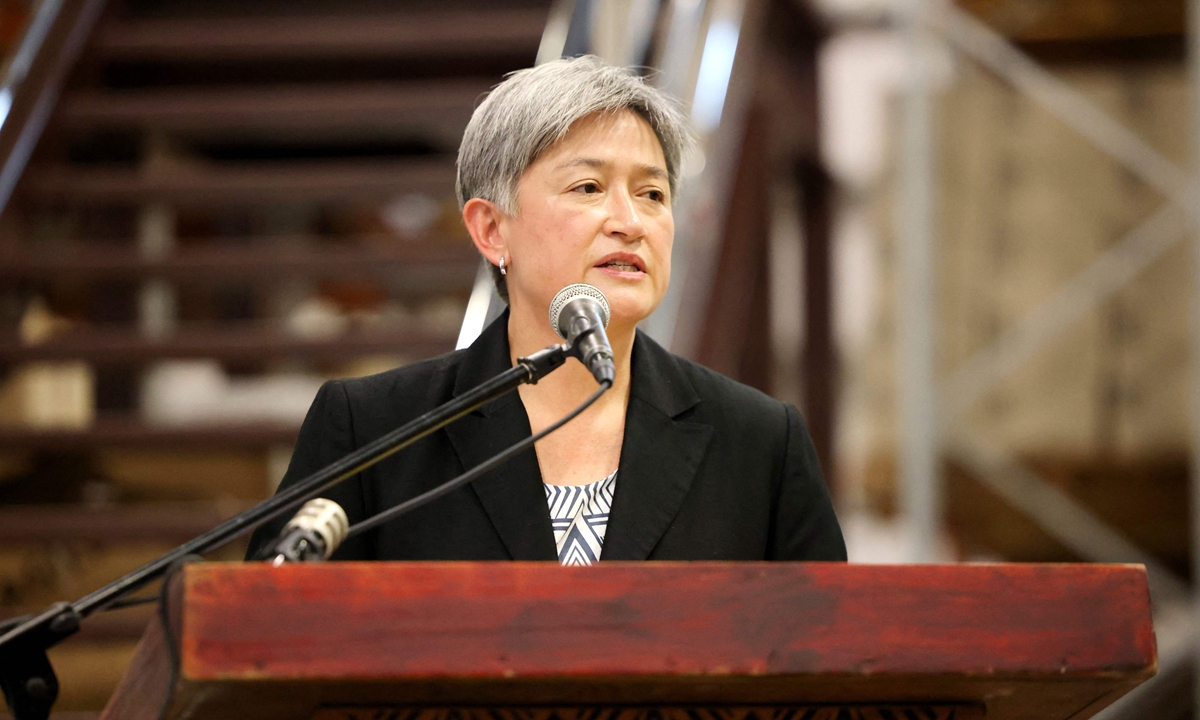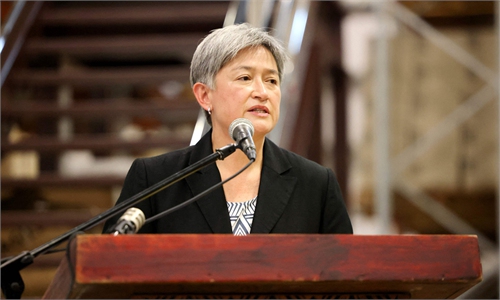Repairing China-Australia ties helps ‘meet expectation’ of fixing trade ties, ‘pave way’ for easing China-US tension: expert

Australian Minister for Foreign Affairs Penny Wong Photo: VCG
Australian Foreign Minister Penny Wong’s visit to China from Tuesday to Wednesday has given rise to great expectation from Australian business circle and the groups that hope recovery of the bilateral ties could boost economic recovery, with Chinese analysts saying China welcomes and encourages Australia to correct the mistakes made by the former government. China also said if Canberra keeps such attitude and shows sincerity through concrete actions, the trade ties could be fixed, stressing that the recovery of China-Australia relations could also pave way for the easing of tensions between China and the US.
Chinese Foreign Ministry Spokesperson Mao Ning said at a routine press conference on Tuesday that “We hope the Australian side can work with China in the spirit of mutual respect and seeking common ground while shelving differences to bring the China-Australia comprehensive strategic partnership back onto the track of sound and steady development.”
Wong’s visit has raised hopes among Australian businesses who have placed great expectation on the recovery of damaged trade ties. According to the Financial Times, “The Business Council of Australia is in the early stages of preparing for a trade delegation to China should the Wong visit lead to a further easing of tensions.”
Companies with exposure to the country — such as airline Qantas and miners BHP and Rio Tinto — could visit if the Chinese government invites the delegation and the trip is approved by the Australian government, according to the report.
Chinese analysts said China and Australia share common interests and the two economies are highly complementary, so without negative impacts from the US strategy that eyes on containing China and extreme Sinophobia within the Oceanian country, there is no reason for Australia to have a bad relationship with China.
Therefore, as long as the Australian government led by Prime Minister Anthony Albanese can respect China’s core interests and stay away from China’s bottom line, and find a flexible and pragmatic way to handle the Australia-China ties and the Australia-US ties at the same time, the hope for fixing bilateral ties, including trade ties, could be realized, experts noted.
Li Haidong, a professor at the Institute of International Relations at the China Foreign Affairs University, told the Global Times that the key reason why the bilateral ties have experienced nightmare in past few years is that the former government of Australia blindly followed US hostile strategy to contain, provoke and even confront China.
“Wong’s visit this time is helpful for the both sides to find where the obstacles are located and how to remove them, and then find the ways to bring exchanges and cooperation in different fields back on track,” Li said.
The China-Australia relationship should be based on autonomous and self-determined policymaking from the two sides, rather than the ties under the control of Washington, Li noted.
Setting example
But from a realistic perspective, some observers said, Australia has always been and will continue to be a US ally with very close strategic ties, and the China-Australia relations are just like a “dependent variable” that change with the China-US relations.
Fifty years ago, the establishment of China-Australia relations was realized on December 21, 1972, so it’s actually following the normalization of the China-US relations which took place in February 1972. And this time, the ice-breaking visit by Wong is also happening after the US sent senior officials to China to seek the stabilization of the China-US relations earlier this month.
Chen Hong, director of the Australian Studies Center at East China Normal University, told the Global Times on Tuesday that although the China-Australia ties are greatly impacted by the China-US relations, the Australian leaders could also find a way to better handle the relations with China and the US at the same time based on a more self-determined decision-making.
Australians can learn such wisdom from their history, Chen suggested. When Edward Gough Whitlam, Australian former prime minister and leader of the Labor Party visited China with the Labor Party delegation in 1971, he was still a leader of the opposition party rather than a prime minister, and this happened before the Richard Nixon’s visit in 1972 that normalized China-US ties. It was under Whitlam's leadership that Australia established formal diplomatic relations with China in 1972.
If the current Australian leaders and politicians can learn from Whitlam’s strategic insight and foresight over the China-Australia relations as well as the international relations, they will be able to find a way to stabilize and sustainably develop the bilateral relations, and even pave way for the recovery of the China-US relations, which is far more crucial for the world in turbulence, Chen noted.
A recovered China-Australia relationship will set a very meaningful example for countries like Canada, the UK, Japan and even the US to fix their ties or at least manage their differences with China, analysts said.
There is an existing example that proves that it’s possible to have close alliance with the US but also benefit from the ties with China at the same time – Australia’s close neighbor New Zealand, and observers suggested that Canberra can also be enlightened by Wellington’s pragmatic and independent diplomacy.
Chen said New Zealand takes a very special stance among the Five Eyes Alliance led by the US, as it’s not interested in participating in international strategic issues too much and has no ambition for influence and power in the region, while Australia is different.
Australia wants to be a key member within the US-led alliance that plays an important role in the Asia-Pacific region, so it has more frictions and problems with other countries in the region, such as China and Indonesia, and this basic situation won’t fundamentally change in the short term, Chen noted.
Meanwhile, Australian Former Prime Minister Kevin Rudd has been appointed Australia’s next ambassador to the US, according to media reports on Tuesday. Rudd, who speaks fluent Putonghua, has written and spoken widely on foreign relations with China since he quit politics in 2013.
Chen said such appointment proved that Australia prioritized the issues related to China when dealing with its top ally the US, and that the Albanese administration is paying efforts to find a way to realize stable ties with the US and recover relations with China at the same time.
Although Australia culturally, ideologically and ethnically closer to North America and Europe, it’s located in the Asia-Pacific region, Chen said. “Therefore, Australia also believes it’s an Asian-Pacific country rather than a pure Western country. Australia’s ties with the regional countries like China and other ASEAN members will normally impact Australia’s interests more directly than its ties with the US,” he said.


